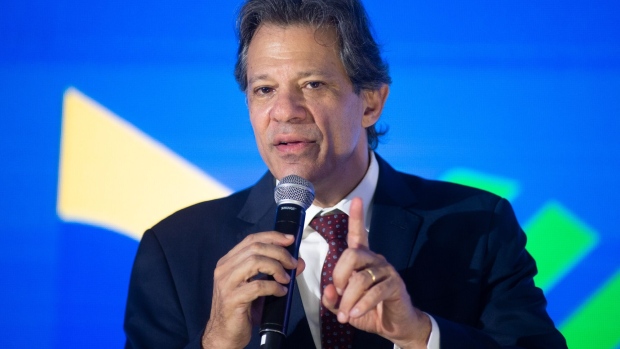Apr 15, 2024
Brazil Will Water Down Key 2025 Budget Target as Spending Rises
, Bloomberg News

(Bloomberg) -- Brazil will target a less ambitious 2025 fiscal outcome than previously indicated, likely disappointing investors who are eager for strong signs that the government plans to control spending and limit deficits.
The economic team will aim for a balanced primary budget, which excludes interest payments, Finance Minister Fernando Haddad said during a Monday television interview. Haddad had previously signaled that the government would target a surplus of 0.5% of GDP for the year. The new goal will be sent to Congress on Monday as part of the official budget guidelines proposal for 2025.
The Brazilian real is the worst performer among major currencies Monday, falling as much as 1.9% against the dollar in afternoon trading.
“Fiscal deterioration has always been in the cards,” said Alejandro Cuadrado, chief FX strategist at BBVA in New York. “The move is not dramatic in size or direction, but it is compounding.”
The change is likely to increase pressure on the real, he said, adding that the primary fiscal balance to stabilize Brazil’s debt should be at least 1 percentage point higher.
President Luiz Inacio Lula da Silva’s administration is trying to counterbalance its desires for increased spending with Haddad’s efforts to sturdy public finances. The economy is expected to slow in coming months, threatening pledges of improved living standards and creating pressure for more outlays. At the same time, the risk of setting targets only to change them later carries credibility risk for the government and local assets.
Read more: Lula Ramps Up Pressure on Finance Chief as Brazil Revenue Rises
Haddad has defied at least some of the financial market’s skepticism so far. Over the first two months of the year Brazil has hauled in 467 billion reais ($90 billion) in tax collections — a record for the period.
The government’s economic team is currently projecting a 2024 deficit of 0.1% of GDP, within the tolerance range of spending rules established last year.
Still, tax income appears to be waning, and analysts expect Lula’s administration will have to alter this year’s zero-deficit target in coming months. Markets are projecting primary gaps of 0.7% of GDP in 2024 and 0.6% in 2025, according to the central bank’s latest weekly survey of economists.
Complicating matters, Brazil’s Congress will hold elections for the heads of the lower house and Senate at the beginning of next year. Some government officials fear the campaigns and vote could make it harder to approve a change as important as the fiscal target.
Haddad, however, said that the government would continue its legislative efforts to increase revenues, adding that the government plans to have its income tax reform proposal done by the middle of this year.
Investors are also closely monitoring succession plans at Brazil’s central bank with chief Roberto Campos Neto’s term set to expire at the end of this year. Lula will pick “a good name” to replace Campos Neto, Haddad said during the interview.
--With assistance from Felipe Saturnino.
(Updates market reaction in third paragraph, adds analyst comment in fourth paragraph and additional Haddad comments in final paragraph.)
©2024 Bloomberg L.P.







